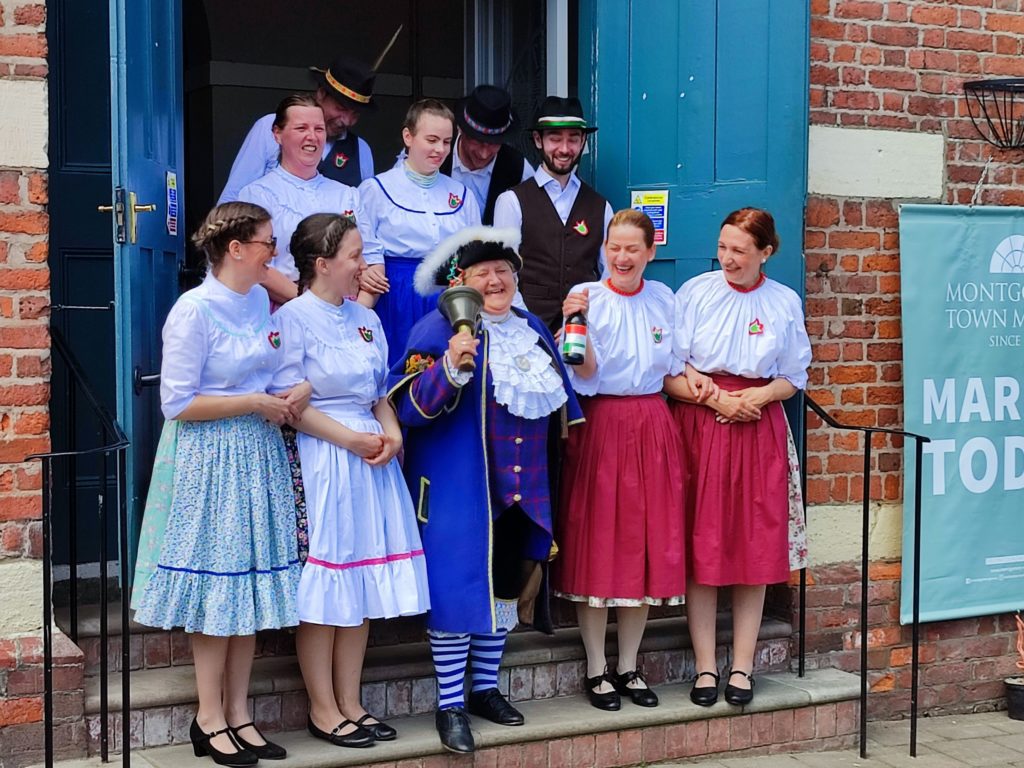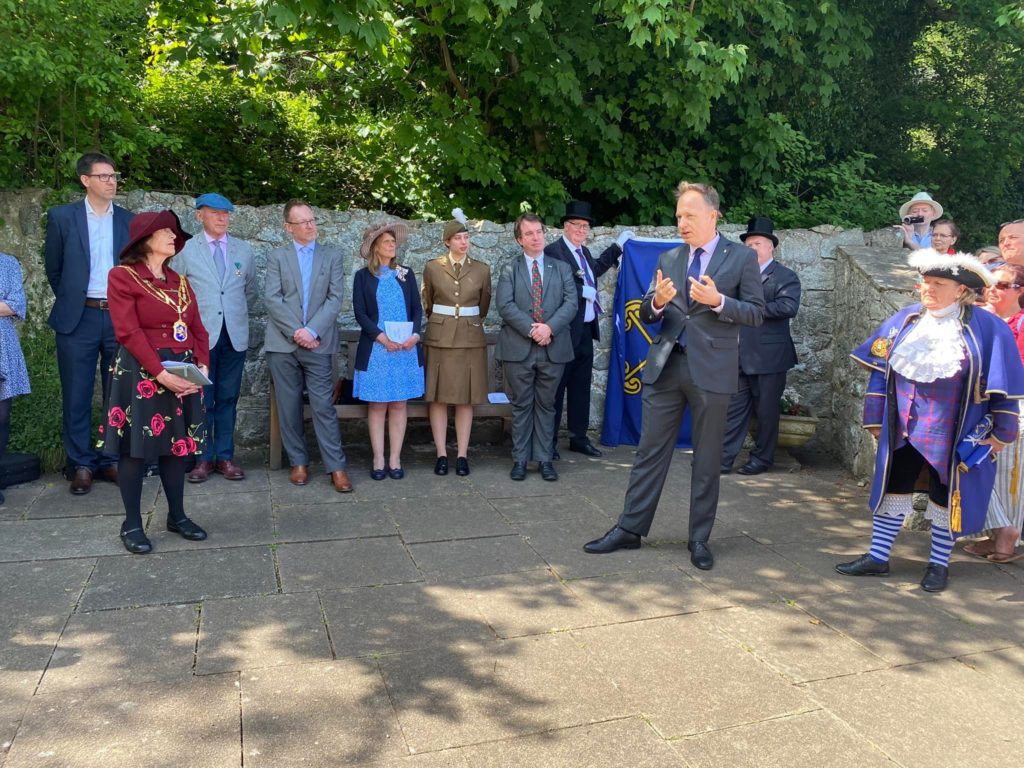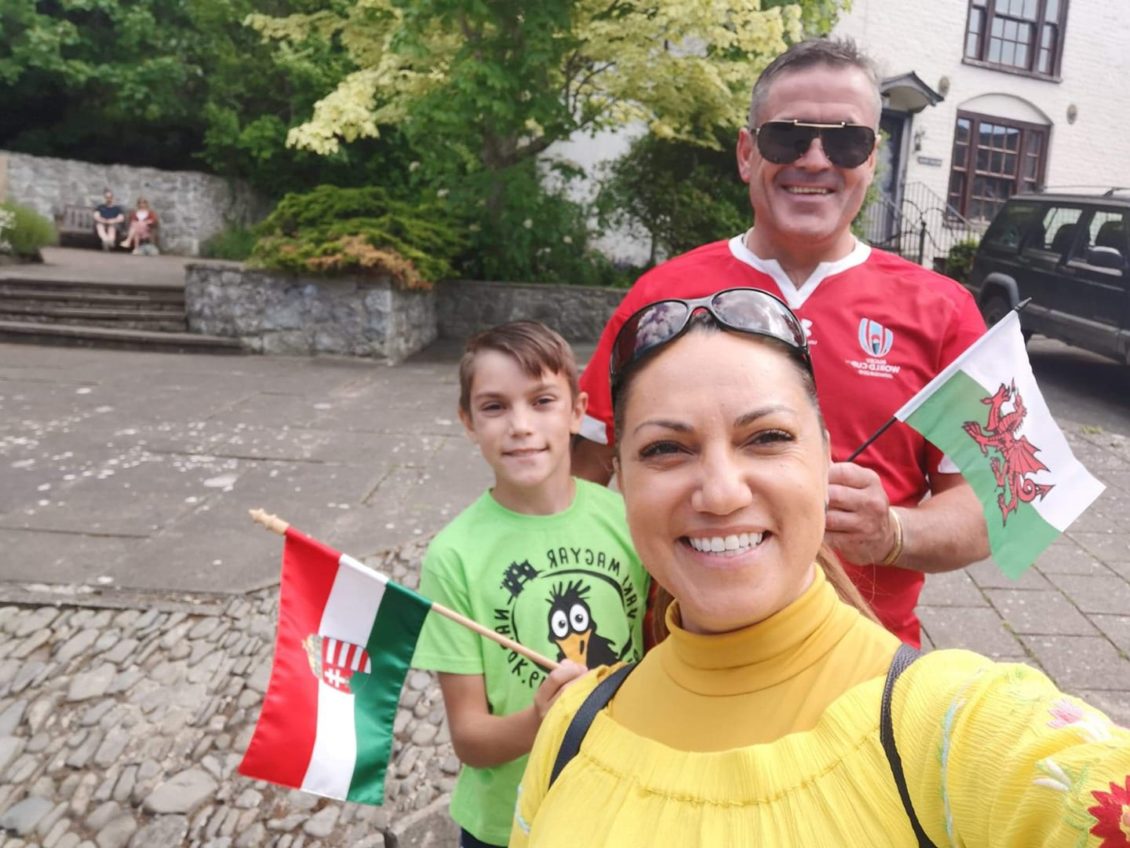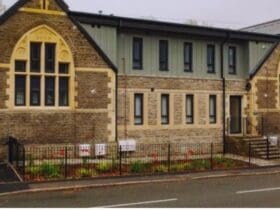Hundreds of Hungarian and Welsh visitors gathered in Montgomery over the weekend, as the Mid Wales town celebrated its unique literary connection with Hungary.
Montgomery’s long-awaited Hungarian Day saw the unveiling of a trilingual memorial plaque dedicated to poet János Arany, whose 1857 ballad ‘The Bards of Wales’ brought the Powys town to fame in Hungary. The famous poem, which tells of the fate of 500 Welsh bards executed by Edward I for not singing his praises at a banquet held in Montgomery Castle, has been taught in Hungarian schools for generations.


The milestone event on Saturday was organised by Montgomery Town Council, in partnership with Welsh-Hungarian cultural initiative Magyar Cymru and the Welsh-Hungarian Cultural Association (WHCA) – following the exchange of some heartfelt video messages between Wales-loving Hungarians and the people of Montgomery during the pandemic.
The town’s idyllic streets were adorned with Hungarian flags, window displays and signs welcoming Hungarian guests in their own language. Throughout the day, visitors could experience a warm Montgomery hospitality, with homemade Goulash at the town’s “Hungarian Café” and an exhibition dedicated to János Arany at Montgomery’s The Old Bell Museum.
Meanwhile, a limited-edition commemorative brew by Monty’s Brewery proved a roaring success with Hungarian tourists, who travelled from across the UK – and even Hungary – to be part of this historic celebration. The unique bottle, featuring the poet’s portrait and both flags, attracted widespread media attention in Hungary.


Jill Kibble, Mayor of Montgomery, said: “This was the first time in the 165-year-old history of The Bards of Wales that hundreds of Welsh and Hungarian people gathered among our beautiful castle ruins. This special day has forever cemented the friendship between our tiny town of Montgomery and the entire country of Hungary. Our passion for Hungarian culture has brought so much to our town, and we look forward to many more years of cultural links with our Hungarian friends.”
Balint Brunner, Founder of Magyar Cymru, added: “I’m delighted that so many fellow Hungarians could witness the kindness and hospitality of the incredible people of Montgomery. These soul-stirring moments will forever be engraved in our memories as we continue to build everlasting bridges between our two cultures. To honour the legacy of this special day and celebrate our diverse cultural links, May 14th will now be known as Welsh-Hungarian Friendship Day.”
The celebrations began with the premiere of Georges Gondard’s ‘Fanfare for Montgomery’, a piece specially written for the occasion, as families and distinguished guests gathered at the plaque for an unveiling ceremony with Hungarian ambassador Dr Ferenc Kumin and Mayor Jill Kibble. Attendees included representatives from the Welsh Government, the UK Government, and the Liszt Institute – Hungary’s cultural centre in London.
Speaking at the ceremony, Ambassador Kumin said: “Every single Hungarian pupil has to memorise this poem and with that we also memorise the name of Montgomery, but we always wonder if it is just part of a mythical world created by our beloved poet János Arany. So, I think every single Hungarian should experience the beauty of this town and the warm welcome of the people here. We should learn about the many connections that exist, because this poem built a very strong bridge between us.”
A moving rendition of the Hungarian and Welsh anthems by local folk ensemble Monty Folk, along with children from Carmarthenshire’s Hungarian-inspired Kodály Violin School, marked the start of a fun-filled afternoon of Welsh-Hungarian activities.
Among the ruins of Montgomery Castle, setting to The Bards of Wales, visitors could enjoy a recitation of the poem in three languages by Montgomery community members and their Hungarian friends, as well as a performance by the Bristol Hungarian Folk Dance Group in colourful traditional costumes – all announced by Montgomery’s Town Crier in her blue regalia and tricorn hat. Meanwhile, Hungarians from across the UK enriched the programme with special wooden crafts featuring Welsh and Hungarian symbols, a Play Corner, and an impromptu saxophone performance to liven up the streets.
Following a stylish reception with Hungarian-inspired canapés by Montgomery’s very own Shed38 in the town’s iconic Town Hall, guests pondered about poetry and cultural heritage with Hungarian academic Dr Márta Minier, Associate Professor of Theatre and Media Drama at the University of South Wales. Meanwhile, the János Arany Memorial Museum in the poet’s birthtown of Nagyszalonta, Transylvania, joined the celebrations with a spectacular video produced specially for Hungarian Day guests in Montgomery.
In the evening, the town’s St Nicholas Church served as the venue for an eclectic mix of Welsh and Hungarian music performances, featuring opera singers Mark Jenkins and Elizabeth Sillo, the Kodály Violin School, and Montgomery’s Côr Trefaldwyn and Monty Folk. Emotions were riding high as the event concluded with a powerful rendition of Welsh classic Calon Lân, with many Hungarian visitors humming and singing the words with pride.
Hungarian Day came early for the local primary school, however. Montgomery pupils spent Friday afternoon making Hungarian hussar hats and partas, before joining children from their sister school in Kunágota – branded Hungary’s “Welshest” village – through a virtual link-up where pupils from both countries showcased their knowledge of one another’s culture and languages.
The workshops followed a series of online sessions delivered by the Welsh-Hungarian Cultural Association to pupils in both Montgomery and Kunágota. Since St David’s Day, Kunágota pupils had been busy learning Welsh and practising Welsh folk songs, while children in Montgomery learned songs in Hungarian and produced videos for their far-away friends.
Elizabeth Sillo, Chair of the Welsh-Hungarian Cultural Association, said: “It was truly emotional to see children in Montgomery and Kunágota meeting through video, after months of preparation. In Montgomery, pupils were waving Hungarian flags and extending a welcome to their new friends with a flawless Hungarian pronunciation.
“We hope the children get to meet in real life one day, and that this new generation continues to embrace the Welsh-Hungarian friendship which is so close to our hearts.”









Leave a Reply
View Comments